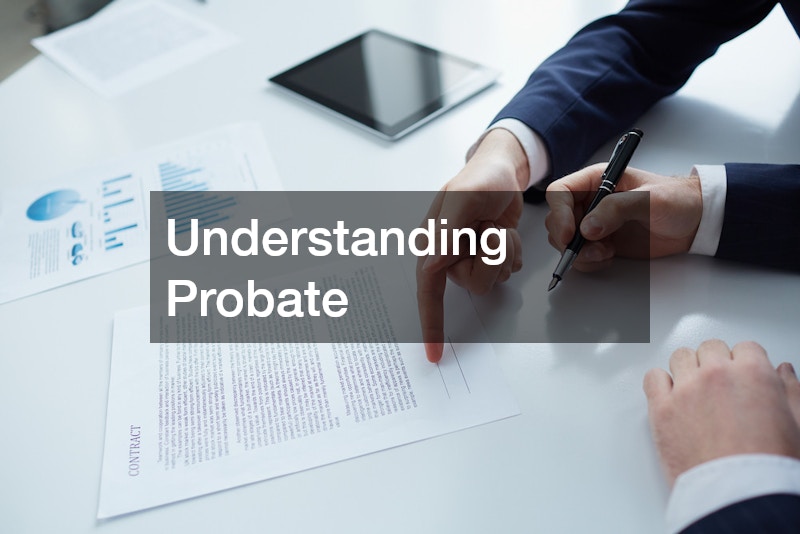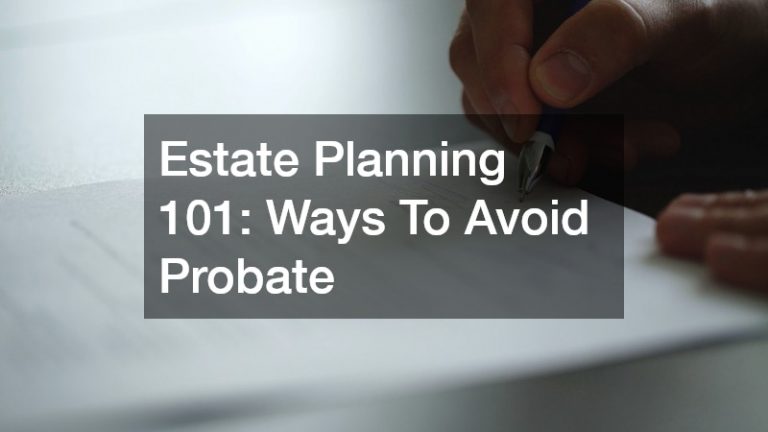When people think about planning for the future, they often overlook one of the most important elements—what happens to their assets after they’re gone. Probate, the legal process of validating a will and distributing an estate, can be time-consuming, costly, and emotionally draining for surviving family members. This is why it’s crucial to understand the various ways to avoid probate and ensure your loved ones experience a smoother transition.
Avoiding probate isn’t just about saving time or money; it’s also about maintaining privacy and preserving control over how your assets are handled. Without proper planning, your estate may fall into the default legal processes that don’t always align with your wishes. The good news is that several proactive strategies can help you steer clear of probate court entirely or at least minimize its impact. These approaches range from simple document updates to more complex tools, such as trusts and joint ownership arrangements.
This article offers a straightforward and comprehensive look at the steps you can take today to protect your estate and provide peace of mind for your heirs. We’ll explore the importance of understanding probate, why it’s worth avoiding, and how to take those first planning steps. From writing a clear will to establishing living trusts and choosing the right legal support, each section will equip you with the knowledge to make smart decisions.
By the end of this guide, you’ll have a solid grasp of practical actions you can implement to reduce the burden on your loved ones. Let’s walk through the essential topics that will help you safeguard your legacy, avoid unnecessary delays, and navigate the legal landscape with confidence.
Understanding Probate

Probate is the legal process that takes place after someone passes away, involving the validation of their will, the payment of debts, and the distribution of assets. This process can be time-consuming and public, often creating added stress for grieving families. Understanding probate is a critical first step in estate planning because it highlights how assets are processed under the court’s supervision. Learning more about the system helps individuals explore ways to avoid probate and preserve their family’s privacy and time.
In the context of estate law, probate proceedings can vary from state to state, but the general structure remains the same: court involvement, legal paperwork, and potential delays. Whether someone dies with or without a will, the estate typically enters probate unless specific measures have been taken.
A deeper understanding of probate within estate law enables individuals to craft effective plans that streamline asset distribution. With proper guidance and a proactive mindset, avoiding or minimizing probate becomes much more attainable. Learning about estate law is the foundation for developing reliable ways to avoid probate.
Why Avoid Probate
Avoiding probate can save families significant time, money, and emotional distress. When a person passes away, their loved ones are often left dealing with overwhelming administrative tasks. If their estate must go through probate, this process can take months or even years, delaying access to assets and creating financial hardships.
Professionals with strong legal experience can help clients understand the nuances of the probate system and guide them toward more efficient solutions. Legal experience helps ensure that all paperwork is completed properly and that nothing falls through the cracks.
Ultimately, leveraging legal experience when designing an estate plan increases the likelihood of success in bypassing the probate process. Thoughtful planning with a professional’s help reduces risk, increases asset protection, and gives peace of mind. Families benefit greatly when estates are structured in ways that limit court involvement and delays. Having an informed advisor allows you to implement ways to avoid probate confidently.
Start With a Plan

One of the most important steps in avoiding probate is starting with a solid plan. Estate planning is not just for the wealthy or elderly—it’s something every adult should consider. By creating a personalized roadmap for your assets and intentions, you reduce the chances of your estate getting caught in a lengthy legal process. Planning is the best way to identify practical ways to avoid probate and ensure your wishes are honored.
Using estate planning services can significantly streamline this process. These services often include consultations with experts who can help draft legal documents, establish trusts, and coordinate asset titling. Their goal is to reduce risk and increase clarity, helping you set up systems that keep your estate out of court.
When estate planning services are used early and updated regularly, they provide a clear blueprint for your financial legacy. These services can adapt to life changes such as marriage, divorce, the birth of children, or the acquisition of new property. With professional help, it becomes far easier to implement strategic ways to avoid probate, ensuring your estate is passed on exactly as you intend, without unnecessary delays or expenses.
Create a Will
Drafting a will is one of the most recognized parts of estate planning. Although it doesn’t entirely avoid probate, it plays a critical role in guiding the process. A will allows you to specify your wishes for how your assets should be distributed and who will be responsible for managing your estate. Even though some assets may still pass through probate, a written will can significantly reduce confusion and legal disputes, making it one of the practical ways to avoid probate-related complications.
When it comes to managing and distributing assets, wills and trusts work best when used together. While a will directs the probate process, a trust can bypass it altogether for specific assets.. A trust can handle the bulk of your assets privately, while your will can address any remaining items, guardianship preferences, and final instructions.
By creating a will and pairing it strategically with other tools like trusts, you establish control and continuity. When thoughtfully prepared, wills and trusts allow your loved ones to experience a more seamless transfer of wealth while still aligning with your broader strategy for ways to avoid probate.
Use Living Trusts

A living trust is one of the most effective tools for keeping assets out of probate. It allows you to transfer ownership of your property into a trust during your lifetime, with clear instructions on how those assets should be managed and distributed after your death. Because the trust holds legal ownership of the assets, they do not have to go through probate, making this a powerful method in your toolkit of ways to avoid probate.
Working with estate planning attorneys is essential when setting up a living trust. These professionals can guide you in choosing the right type of trust, titling your assets properly, and naming reliable trustees. A poorly written or underfunded trust can still leave assets vulnerable to probate, which is why the expertise of estate planning attorneys is so valuable.
A well-executed living trust provides both privacy and efficiency, as its terms are not part of the public record and the distribution of assets can occur almost immediately upon death. It can also allow for long-term control over how assets are used, which is especially helpful for minor children or beneficiaries with special needs. For those seeking the most direct ways to avoid probate, working with estate planning attorneys to create a living trust is one of the most proactive and reliable steps available.
Name Beneficiaries
Another simple but powerful tactic in avoiding probate is designating beneficiaries on your financial accounts. Retirement accounts, life insurance policies, and certain bank accounts often allow you to name who should receive the funds upon your death. These designations override any instructions in your will, ensuring the assets go directly to your chosen beneficiaries without needing court involvement.
An estate planning lawyer can help you review your accounts and ensure your beneficiary designations align with your overall estate plan. It’s not uncommon for people to forget to update their beneficiaries after life changes like marriage, divorce, or the birth of children. An outdated designation can lead to legal conflict or unintended outcomes.
When used properly, beneficiary designations can simplify the transfer of wealth while reducing emotional and financial stress for your loved ones. It’s a relatively low-cost and straightforward way to keep specific assets out of probate entirely. Consulting an estate planning lawyer to ensure all designations are current and coordinated with your broader goals is one of the most practical and reliable ways to avoid probate.
Joint Ownership Tips

Joint ownership is another effective method for bypassing probate. When property is owned jointly with rights of survivorship, the surviving owner automatically takes full possession upon the other’s passing. This arrangement is commonly used for real estate, vehicles, and bank accounts. Because the property does not become part of the deceased’s estate, it avoids the probate process altogether. For many families, joint ownership presents one of the more accessible ways to avoid probate.
While it might seem simple, establishing the right form of joint ownership can be nuanced. A law firm can offer guidance on how to title property. You may list it as joint tenants with rights of survivorship, tenants by the entirety, or community property with right of survivorship. Each has its legal implications, depending on your state.
Adding someone as a joint owner is not a step to take lightly. It can create unintended legal and tax consequences, especially if the co-owner is not a spouse. For this reason, it’s important to consult a reputable law firm to structure joint ownership appropriately. With their help, joint ownership becomes a powerful and strategic approach among the many ways to avoid probate.
Gift While Living
Giving assets to loved ones while you’re still alive can be a practical way to reduce the size of your estate and avoid probate later. Lifetime gifting allows you to see the impact of your generosity and can help family members financially while avoiding future legal entanglements. This strategy is especially useful for individuals looking for flexible and personal ways to avoid probate.
An experienced attorney can assist you in developing a gifting strategy that considers tax limits and legal safeguards. The IRS allows individuals to gift a certain amount each year tax-free, and larger gifts may require additional planning. An attorney will ensure your gifts are documented properly and that you’re not unintentionally disqualifying yourself from other benefits or protections.
By making thoughtful gifts during your lifetime, you reduce the number of assets subject to probate upon your passing. This approach also offers the opportunity to educate your beneficiaries and observe how they manage the resources. When done under the guidance of an attorney, lifetime gifting becomes one of the more personally fulfilling ways to avoid probate while supporting your loved ones in the present.
Seek Legal Help
No matter how simple or complex your estate may be, professional legal guidance is essential. Many people make avoidable mistakes when managing their estate plans, especially if they rely solely on online templates or outdated information. Partnering with a trusted family attorney at law ensures your documents are valid, your wishes are clear, and your estate is structured with proven ways to avoid probate in mind.
A family attorney at law offers both legal knowledge and a personal touch. They take the time to understand your goals and family dynamics. Whether you need help creating a trust, drafting a will, or updating beneficiary designations, they can provide tailored advice that accounts for changes in life and legislation. They’ll also help coordinate your plan so that it works as a cohesive whole.
This professional can help you periodically review and revise your estate plan as your circumstances evolve. Having this consistent legal support makes it far easier to implement and maintain ways to avoid probate. It will give you confidence that your estate will be handled exactly as you intend.
Keep Docs Updated
Even the best estate plan can fail if it’s not kept up to date. Life changes quickly—marriages, divorces, births, deaths, and asset acquisitions can all impact how your estate should be handled. Regularly reviewing your documents ensures everything reflects your current wishes and avoids unnecessary legal entanglements. Staying current is one of the simplest, yet most often overlooked, ways to avoid probate complications.
A probate attorney plays a critical role in keeping your estate plan on track. These professionals understand how outdated or improperly prepared documents can result in an estate going through probate even when that wasn’t the original intent. By working with a probate attorney periodically, you ensure your plans remain valid under current laws. You also make sure that your assets are positioned for efficient transfer to your heirs.
Updating your estate documents doesn’t have to be difficult. An attorney can review your wills, trusts, titles, and beneficiary forms to confirm alignment and completeness. This kind of routine maintenance can make a significant difference when the time comes to execute your plan. It reinforces your broader strategy and solidifies your efforts in finding the most effective ways to avoid probate for your loved ones.
Peace of Mind
Estate planning is often seen as a task to delay. However, taking action today can make all the difference for your family tomorrow. In this guide, we explored key strategies that help simplify the future and minimize the burden on those left behind. From understanding the probate process and its drawbacks to implementing legal tools like living trusts, updated wills, and beneficiary designations, every step plays a role in crafting a plan that reflects your wishes.
We also emphasized the importance of seeking professional support. Whether you’re using a firm to draft your plan, setting up joint ownership, or reviewing your documents with a legal advisor, these actions are critical to keeping your estate outside the courtroom. Guidance from experienced professionals ensures your strategy is legally sound and customized for your personal circumstances. This proactive approach makes it much easier to pursue effective ways to avoid probate.
By taking these steps, you provide your loved ones with clarity, speed, and peace of mind during a time that would otherwise be filled with uncertainty. Estate planning, when done correctly, preserves privacy, protects assets, and empowers those you care about most. Use this foundational knowledge to shape a plan that reflects your values and avoids unnecessary delays through the right ways to avoid probate.




